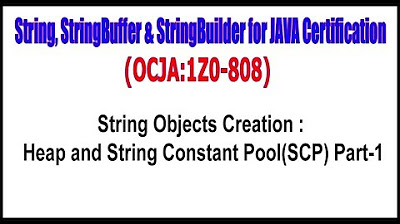Objects vs Primitives
Summary
TLDRIn this guest lecture, Calvin explains the key differences between primitives and objects in Java. He covers the distinctions in type naming conventions, memory storage, and comparison methods. Primitives are simple data types, whereas objects are instances of classes, with memory references pointing to their data. Calvin illustrates these concepts with practical examples, emphasizing how memory addresses affect comparison and method calls. The video also touches on important concepts like null pointers and method parameter passing. This in-depth explanation is ideal for understanding how Java handles data types and memory management.
Takeaways
- 😀 Primitives in Java are basic data types like int, char, and boolean, while objects are instances of classes with attributes and methods.
- 😀 Primitives are written in lowercase (e.g., int, char), while objects use capital letters (e.g., String, Person).
- 😀 Primitives are stored directly in memory, while objects store references to memory locations where data is actually kept.
- 😀 Objects are composed of other data types, such as strings or ints, and can hold complex data structures.
- 😀 Primitives are simple building blocks, while objects are more complex, acting like 'molecules' made up of smaller data types.
- 😀 When comparing primitives, the '==' operator compares their actual values, while for objects, it compares their memory addresses.
- 😀 To compare objects' data (e.g., string content), you should use the '.equals()' method instead of '==' in Java.
- 😀 String literals in Java are optimized to point to the same memory location to save space, which can make '==' return true in certain cases.
- 😀 When passing a primitive to a method, a copy of its value is passed, meaning changes to the parameter won't affect the original variable.
- 😀 When passing an object to a method, a reference to the object is passed, meaning changes to the object inside the method affect the original object outside it.
Q & A
What is the key difference between primitives and objects in Java?
-Primitives are basic data types like int, char, and boolean, and they store actual values. Objects, on the other hand, are instances of classes and store references to memory locations where data is stored, not the data itself.
How are primitive types written in Java?
-Primitive types in Java are written in lowercase, such as 'int', 'char', 'boolean', and 'double'.
What do you need to create a new object in Java?
-To create a new object in Java, you generally use the 'new' keyword, except for the 'String' type, which Java handles behind the scenes.
What is the difference between how primitives and objects are stored in memory?
-Primitives store the actual value in the variable, while objects store a reference to a memory location where the actual data is stored. Objects are essentially pointers to locations in memory.
Why do we need to use '.equals()' when comparing objects in Java?
-In Java, the '==' operator compares the references (pointers) of objects, not their actual data. To compare the contents of two objects, we use the '.equals()' method, which checks the data inside the objects.
What happens when you compare two strings using '==' and '.equals()'?
-Using '==' compares the memory location (pointer) of the two strings, which may return false even if the strings contain the same value. The '.equals()' method compares the actual content of the strings, returning true if they are equal.
What is the special behavior of strings in Java when comparing them using '=='?
-Strings in Java are handled specially. When strings are created using string literals (e.g., 'String str = 'hello';'), Java may optimize memory usage by pointing both variables to the same memory location, making '==' return true even if they are not the same object.
What happens when primitives are passed to methods in Java?
-When a primitive is passed to a method, its value is copied into the method's parameter variable. Changes to the parameter do not affect the original variable.
How does passing an object to a method differ from passing a primitive?
-When an object is passed to a method, the reference (memory address) of the object is passed, meaning changes made to the object inside the method affect the original object. In contrast, changes to primitives inside a method do not affect the original variable.
What is a 'null pointer exception' in Java?
-A 'null pointer exception' occurs when a method is called on an object that is a null pointer, meaning the object does not point to any valid memory location. It is not allowed to invoke methods on a null pointer.
Outlines

Esta sección está disponible solo para usuarios con suscripción. Por favor, mejora tu plan para acceder a esta parte.
Mejorar ahoraMindmap

Esta sección está disponible solo para usuarios con suscripción. Por favor, mejora tu plan para acceder a esta parte.
Mejorar ahoraKeywords

Esta sección está disponible solo para usuarios con suscripción. Por favor, mejora tu plan para acceder a esta parte.
Mejorar ahoraHighlights

Esta sección está disponible solo para usuarios con suscripción. Por favor, mejora tu plan para acceder a esta parte.
Mejorar ahoraTranscripts

Esta sección está disponible solo para usuarios con suscripción. Por favor, mejora tu plan para acceder a esta parte.
Mejorar ahoraVer Más Videos Relacionados

AP CS A - 2.8 Wrapper Classes

How Passing Arguments Works_ Value vs Reference | JavaScript 🔥 | Lecture 120

OCJA(1Z0 - 808) || String Objects Creation Heap and String Constant Pool (SCP) Part - 1

Constructors in Java

Reaksi Gelap Fotosintesis ( Fiksasi CO2 / Siklus Calvin)

Spring Interview Question and Answers for fresher and experienced part 2 | Code Decode
5.0 / 5 (0 votes)
